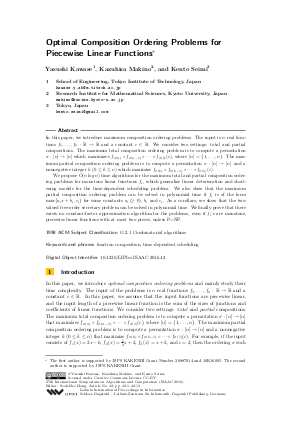Optimal Composition Ordering Problems for Piecewise Linear Functions
Authors Yasushi Kawase, Kazuhisa Makino, Kento Seimi
-
Part of:
Volume:
27th International Symposium on Algorithms and Computation (ISAAC 2016)
Part of: Series: Leibniz International Proceedings in Informatics (LIPIcs)
Part of: Conference: International Symposium on Algorithms and Computation (ISAAC) - License:
 Creative Commons Attribution 3.0 Unported license
Creative Commons Attribution 3.0 Unported license
- Publication Date: 2016-12-07
File

PDF
LIPIcs.ISAAC.2016.42.pdf
- Filesize: 433 kB
- 13 pages
Document Identifiers
Subject Classification
Keywords
- function composition
- time-dependent scheduling
Metrics
- Access Statistics
-
Total Accesses (updated on a weekly basis)
0PDF Downloads0Metadata Views
Abstract
In this paper, we introduce maximum composition ordering problems. The input is n real functions f_1 , ... , f_n : R to R and a constant c in R. We consider two settings: total and partial compositions. The maximum total composition ordering problem is to compute a permutation sigma : [n] to [n] which maximizes f_{sigma(n)} circ f_{sigma(n-1)} circ ... circ f_{sigma(1)}(c), where [n] = {1, ... , n}. The maximum partial composition ordering problem is to compute a permutation sigma : [n] to [n] and a nonnegative integer k (0 le k le n) which maximize f_{sigma(k)} circ f_{sigma(k-1)} circ ... circ f_{sigma(1)}(c).
We propose O(n log n) time algorithms for the maximum total and partial composition ordering problems for monotone linear functions f_i , which generalize linear deterioration and shortening models for the time-dependent scheduling problem. We also show that the maximum partial composition ordering problem can be solved in polynomial time if f i is of the form max{a_i x + b_i , c_i } for some constants a_i (ge 0), b_i and c_i. As a corollary, we show that the two-valued free-order secretary problem can be solved in polynomial time. We finally prove that there exists no constant-factor approximation algorithm for the problems, even if f_i's are monotone, piecewise linear functions with at most two pieces, unless P=NP.
Cite As Get BibTex
Yasushi Kawase, Kazuhisa Makino, and Kento Seimi. Optimal Composition Ordering Problems for Piecewise Linear Functions. In 27th International Symposium on Algorithms and Computation (ISAAC 2016). Leibniz International Proceedings in Informatics (LIPIcs), Volume 64, pp. 42:1-42:13, Schloss Dagstuhl – Leibniz-Zentrum für Informatik (2016)
https://doi.org/10.4230/LIPIcs.ISAAC.2016.42
BibTex
@InProceedings{kawase_et_al:LIPIcs.ISAAC.2016.42,
author = {Kawase, Yasushi and Makino, Kazuhisa and Seimi, Kento},
title = {{Optimal Composition Ordering Problems for Piecewise Linear Functions}},
booktitle = {27th International Symposium on Algorithms and Computation (ISAAC 2016)},
pages = {42:1--42:13},
series = {Leibniz International Proceedings in Informatics (LIPIcs)},
ISBN = {978-3-95977-026-2},
ISSN = {1868-8969},
year = {2016},
volume = {64},
editor = {Hong, Seok-Hee},
publisher = {Schloss Dagstuhl -- Leibniz-Zentrum f{\"u}r Informatik},
address = {Dagstuhl, Germany},
URL = {https://drops.dagstuhl.de/entities/document/10.4230/LIPIcs.ISAAC.2016.42},
URN = {urn:nbn:de:0030-drops-68126},
doi = {10.4230/LIPIcs.ISAAC.2016.42},
annote = {Keywords: function composition, time-dependent scheduling}
}
